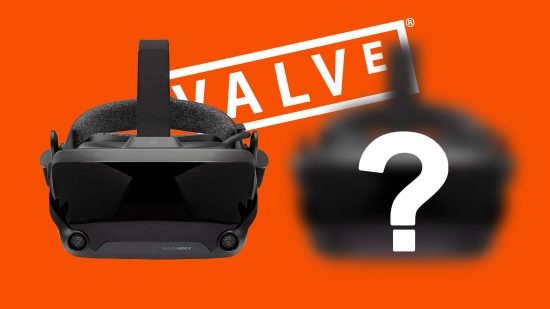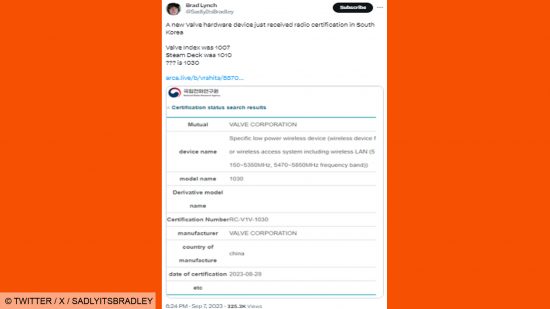As the Valve Index approaches its fifth-year anniversary, it still remains one of the most high-powered VR headsets available today. While it’s more than capable of playing the best VR games, a newly discovered South Korean radio certification listing could allude to the upcoming release of the headset’s successor, the Valve Index 2, which has often been codenamed Deckard.
The certification, as discovered by Twitter user SadlyItsBradly, lists an unknown piece of Valve hardware, simply named, ‘1030’. Posted on the country’s ‘National Radio Research Agency’ website, the classification is noted as being for ‘specific low power wireless devices’ which could refer to all manner of WiFi or Bluetooth-enabled devices but which it would make sense to refer to a Valve Index 2 (Deckard).
Other notable Valve hardware, such as the Steam Deck, has appeared on similar listings, with that devices listed as model name ‘1010’. The original Valve Index also appeared previously, under the model name of ‘1007’, so it’s highly likely this discovery is a nod to a new piece of Valve tech coming our way.
While the classification is intriguing in its own right, there have been even more discoveries relating to possible new tech from Valve. Phoronix, a site dedicated to covering anything and everything to do with Linux, found some references possibly alluding to the new hardware within the code for Linux Kernel 6.6.
Within the update, code pertaining to ‘Galileo’ and ‘Sephiroth’ was found added under ‘Valve Jupiter device.’ This isn’t much to go on at first glance, but it’s interesting to note that Sephiroth is the name of the antagonist from the video game Final Fantasy VII. Meanwhile, ‘Aerith’ is also an iconic character from the same game and is the given name for the Steam Deck’s APU, so it could be that Valve is sticking to the FFVII naming conventions for its new hardware.
For now, even with these latest discoveries, all we can do is speculate as to what Valve might be cooking up. While both discoveries could pertain to the existence of the Valve Index 2, they could just as well be relating to a VR Steam Deck, or even the Steam Deck 2. It hasn’t been long since the Steam Deck’s release, but an updated version of the handheld with an OLED screen and updated processors would be a welcome addition to the Valve hardware lineup, especially in the face of competition from the Asus ROG Ally and Lenovo Legion Go.
Whatever the certification, and Linux Kernel code found by Phoronix is referencing, it’s exciting to know that new Valve hardware is likely coming our way.
Our Valve Index review gives an in-depth look at everything you can expect from the VR headset, if you’re curious to find out more. If the Index isn’t for you, our best VR headset guide is a great starting off point to take your PC gaming to the next level.

